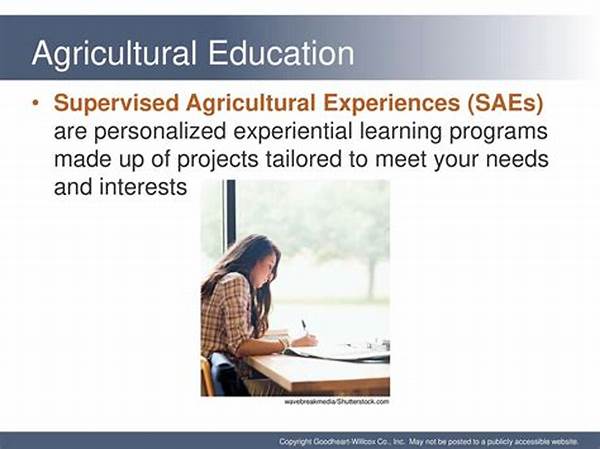Hey there, folks! Today, we’re diving into the world of educational agricultural experiences. If you’re thinking that farms are just about tractors and mud, think again. There’s a whole lot more going on, and it’s honestly fascinating how much there is to learn and experience. Grab your boots (or at least your imagination), and let’s explore what it means to learn straight from the land. Educational agricultural experiences are not just about growing crops or raising animals; they are about cultivating knowledge and understanding the interconnectedness of our natural world.
Read Now : Family-friendly Waterpark Hotel Packages
Discover the World of Agricultural Learning
When we talk about educational agricultural experiences, we’re talking about diving headfirst into the realm where education meets nature. Imagine walking through lush fields, touching the soil with your own hands, and getting to know the crops as they sway with the breeze. It’s like stepping into a living classroom where every element has something to teach. These experiences take you beyond textbooks, offering a tactile understanding that sticks with you. You’re not just learning about agriculture; you’re living it.
In an era where everything feels digitized, these hands-on educational agricultural experiences offer a refreshing retreat. They reconnect us with the roots of our food supply and the resilience of nature. Moreover, this isn’t just about imparting knowledge; it’s about creating memories. Participants of all ages can engage in activities like planting seeds, harvesting produce, or even observing animal husbandry. What’s more, these experiences can nurture a deeper respect for the environment and highlight the importance of sustainable practices. So, whether you’re a student, a lifelong learner, or a weekend adventurer, educational agricultural experiences are a must-try!
Why Educational Farming Is the Next Big Thing
1. Connects Minds with Nature: Educational agricultural experiences bridge the gap between the digital world and the natural environment, providing an oasis for learning embedded in nature.
2. Interactive Learning: Unlike traditional education, here learning is hands-on. Participants get involved in every step of the agricultural cycle.
3. Fosters Environmental Responsibility: By engaging with the process of growth and cultivation, individuals develop a deeper sense of duty towards the environment.
4. Promotes Community Engagement: These experiences often involve community interaction, which can foster a sense of togetherness.
5. Inspires Future Generations: By showcasing the importance and beauty of agriculture, these experiences can inspire youth to consider careers in farming and environmental sciences.
The Unexpected Joys of Farm Education
Alright, time for a confession. Before diving into these educational agricultural experiences, I had no idea how captivating farming could be. For someone who’s spent most of their life amidst city chaos, the farm life felt like a different world altogether. You wouldn’t believe how satisfying it is to plant a seed and watch it grow over time.
Now, living the farm life even for a day brought out all sorts of unexpected joys. First, there’s the sheer beauty of seeing a field come to life with colors – greens, yellows, and the occasional splash of bright reds. Beyond the visual appeal are the stories each plant, each animal tells. It’s a narrative of survival, adaptation, and growth, all wrapped up in these educational agricultural experiences. And then, there’s the community aspect. Interacting with others who are just as eager to learn creates a shared camaraderie that sticks with you long after the experience ends.
Nurturing Knowledge on the Farm
1. From Soil to Spoon: Understand the journey of food from field to table, a crucial aspect often overlooked in urban living.
2. Animal Care Insights: Learn about the nuances of raising livestock, a delicate balance of science and nurture.
3. Crop Cultivation Techniques: Witness the techniques used in sustainable agriculture, from composting to crop rotation.
4. Biodiversity Appreciation: Experience the richness of farm ecosystems and the role of different species within it.
Read Now : Family-friendly Adventure Resort Getaways
5. Hands-on Experiences: Whether it’s milking a cow or harvesting crops, these moments are both educational and fun.
6. Produce Processing: Learn how fresh produce is turned into market-ready products with insights into processes like fermentation and dehydration.
7. Eco-friendly Practices: Discover techniques used to minimize environmental impact, a crucial component of modern agriculture.
8. Farm-to-Table Cooking: Engage in cooking sessions that emphasize the freshness and flavors unique to farm-fresh ingredients.
9. Woodland Walks and Wildlife: Explore nearby woods, offering opportunities to learn about local flora and fauna.
10. Seasonal Changes: Observe how farms adapt to different seasons, each bringing its own set of challenges and rewards.
Embracing Sustainable Practices
As you delve deeper into educational agricultural experiences, you begin to see sustainability not just as a buzzword but as an essential way of living. On the farm, sustainable practices are everywhere—from using resources efficiently to ensuring the land remains productive for future generations. It’s an eye-opener, and for many, a call to action.
Swapping stories with fellow participants only enriches the experience. Everyone seems to have that one ‘aha’ moment, usually when they realize just how much detail goes into responsible farming. It’s a mix of art and science, intention and action. And as you leave, these experiences shape how you view not just food but the world. They serve as a poignant reminder of our role in sustainability and how each step, no matter how small, contributes to a larger picture. Yes, educational agricultural experiences can be transformative. After all, when you connect with the land, it stays with you.
Conclusion: Reaping the Benefits of Farm Learning
To wrap it all up, educational agricultural experiences aren’t just a passing trend; they’re a movement—one that’s reviving our connection to nature and taking us back to basics. We learn in these settings that agriculture is robust and multi-faceted. Far from being limited to rural schools or farmer’s guilds, these experiences now cater to anyone—urban dwellers, overseas tourists, or digital nomads seeking a taste of something real.
In the end, these experiences underline an essential truth: we are deeply intertwined with the land in ways that modern living often ignores. As you immerse yourself in these opportunities, you offer your brain a vacation from screens and your spirit a taste of something authentic. So why not embrace the chance to learn, grow, and reconnect? Educational agricultural experiences await, and trust me, they’re worth every moment.



